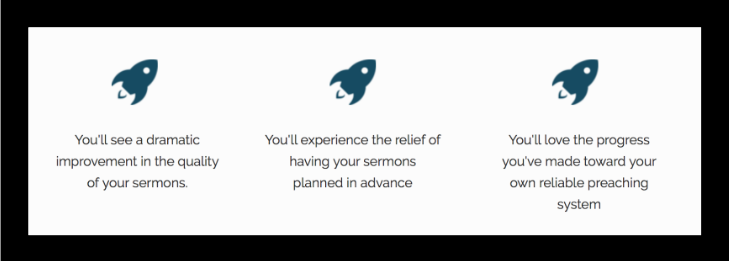Busting Stereotypes In Your Preaching To The Unchurched
If we’re going to lead people who are far from God towards Jesus, we have to bust their stereotypes. This begins with understanding their mindset.
**(This is a compiled excerpt from one of the sections in Preaching Rocket module 5, “Preaching To The Unchurched!”
Do you know what an unchurched, non-Christian thinks of you, pastor?
- You’re out of touch
- You’re judgmental
- You have a political agenda
- You believe in fairy tales: the world was created in seven days, a boat saved all the animals from a flood, a whale swallowed a prophet, a talking donkey, and guys who walked on water
- You’re just out to convert me and get my money
You don’t view yourself this way because you know yourself. But you probably have specific types of people that you view through a stereotypical lens.
That’s how unchurched unbelievers view you.
So how do you build a bridge from you to them—a bridge that they will actually walk across? If you want to give them truth and lead them to Jesus, you have to bust their stereotypes.
These aren’t the only solutions, but they are three things to consider as you prepare your next sermon.
One: Be Yourself
I want to make sure you get this: if an unchurched person shows up at your church, and you stand up to preach, he or she is NOT thinking, “Oh good, here’s the dispenser of Bible truth. I hope he or she is a good expositor of the Word!”
Nope.
They’re thinking, “Who is this person? Do I like him or her? Could I hang out with them?”
Those are the first questions you want to answer.
If they answer with a YES, then they’ll open up to you, and that will give you an opportunity to dispense Bible truth to them. That will give you lots of opportunities to teach them the Word.
So be yourself. Talk like you talk. Use normal words.

Two: Use Humor
Using humor is another way you can bust stereotypes. You may not be a “funny” person, but you can always…
- Show a funny video or picture
- Brainstorm humor with a funny friend before you speak
- Interview a funny person
- Make fun of yourself
When you incorporate humor, unchurched people think, “He or she is a real person. I could hang out with them.”
It’s especially important at the top of your sermon. This is when unchurched people still have their arms crossed.
1) Start with a story or a joke.
If you’re preaching on marriage, start with a funny marriage joke. Or read the difference between what you found when you Googled “questions for married couples” and “questions for a first date.” You could do the same thing to highlight the difference between men and women.
Better yet, start with an embarrassing story from your own marriage (get your spouse’s permission ahead of time, please!)
2) Let the Bible bring humor.
If you’re reading a Bible passage and there’s something funny in it, let it be funny. For example, if you’re reading the story of Samson in Judges and you come across this passage in chapter 16, So Delilah said to Samson, “Tell me the secret of your great strength and how you can be tied up and subdued.” Samson answered her, “If anyone ties me with seven fresh thongs…” Yep, you can just pause there. You don’t ever have to say a word.
Three: Be Authentic
Again, let me reiterate…
An unchurched person wants to know who you really are.
As pastors, we think they want us to help them with their lives. And that may be true … eventually.
But first they have to know us in order to trust us.
Barnes and Nobles is filled with books offering practical help for your life.
I’m assuming (and I may be wrong) that many of them don’t really help or work, but unchurched people may believe that they do.
Recently, I went and checked out a magazine wrack. This was the title of some literal magazine articles…
- “How to radiate Assurance and Self- Esteem.” I read it. It didn’t work.
- “Six Steps to Happiness. Guaranteed.” I’m currently on step three.
- “How to Drive Your Man Wild in the Bedroom.” I gave it to my wife!
Yes, you need to give them a great sermon, but you also need to bust their stereotypes by being authentic and vulnerable.

One of the best ways to do this is by talking about things that have happened in your past. Or, things you’re currently struggling with.
One time I was speaking about how difficult it is for some people to have close relationships with others. I told a few stories about my abusive father.
I shared how one of my earliest childhood memories was one night when I was about four. I was asleep, but I woke up to my parents yelling downstairs. I ran down, afraid of what my father might do to my mother.
I grabbed my father by the legs and tried to push him away from her, which I couldn’t. I think my father was embarrassed. And so instead of doing anything to her, he went to her most prized possession—something her mother had left her when she died. He broke it on the floor and then stormed out of the house.
My mom and I sat on the living room floor, crying together and holding this broken heirloom.
Fun memories, huh?
Later that week, after I told that story, a girl named Jacquelyn, who is about 23, told me, “Guess what, Ed said he’ll come every week now!”
Jacquelyn had been coming to our church for four years. Her husband had come maybe four times, but he happened to be there that morning.
When he walked out that day, he told her, “Okay, I’ll come every week.”
She said, “Why?”
He said, “I didn’t know his father was like that. He understands me. I can listen to him now.”
Turns out his father was abusive, too. Ed started coming every week, gave his life to Christ, got baptized, and now leads a small group.
All because he heard about someone else’s brokenness. And that broke through his cynicism about the church.
At one point I decided to lose some weight. My best friend is a real athlete, so he helped me with an eating plan and an exercise program.
Well, I lost a lot of weight – which I’ve since put back on – but one day my best friend said to me, “Hey, you look great. What’s your weight down to now?”
It just so happened that I had weighed myself that morning, so I knew exactly what it was, so I opened my mouth and answered him, but the answer I gave was one pound less than reality. I lied to him. I don’t know why. I didn’t plan to. I don’t know why I thought the one pound would impress him that much. I don’t know why I cared what he thought.
Two weeks later, I was writing a sermon about how we tend to play God. And one of the symptoms is that when you play God, you have to control people’s impression of you. Because you’re not really God, and you can’t let them know that, you’ll lie to protect your image.
I thought, “How can I make this real for people? Do I have any stories about this? Then I thought about lying to my friend about the one pound.”
I didn’t want to share that story, but that’s who I am. That’s the journey I was on. So I told it.
And I wondered, “How many people are going to come back next week?” I could just picture people thinking, “You know, I don’t expect our preacher to be perfect, but I’d at least like one who doesn’t lie to his best friend!”
I really thought some people might stop coming.
But you know what happened? I had a bunch of people thank me! People said things like…
“Thank you so much for sharing that.”
“I do things like that, too.”
“I thought it was just me. You really helped me today.”
Being authentic busts people’s stereotypes.
The Rocket Company has partnered with seasoned, experienced, and passionate pastors to create a revolutionary, step-by-step preaching system designed to take the stress out of creating powerful sermons each week.
It’s called Preaching Rocket. Here’s what one pastor said…
I’ve been preaching since 1968. Preaching Rocket is the single greatest tool I have ever used to get better.
Preaching Rocket gives you the practical tools to boost your preaching that you never got in school. One of the modules focuses on how to preach to the unchurched.
CLICK HERE!
Preaching Rocket is a revolutionary, step-by-step system designed to take the stress and worry out of creating powerful sermons each week.

THE PREACHING ROCKET CORE COACHING PROGRAM INCLUDES:
- Twelve action-oriented coaching modules complete with written coaching, video coaching, and a listener’s guide.
- Access to the resource vault where you can download spreadsheets, documents, and other planning assets.
- 52 preaching illustrations to pepper your preaching with interesting stories from science, history, sports, culture, and other parts of life.
